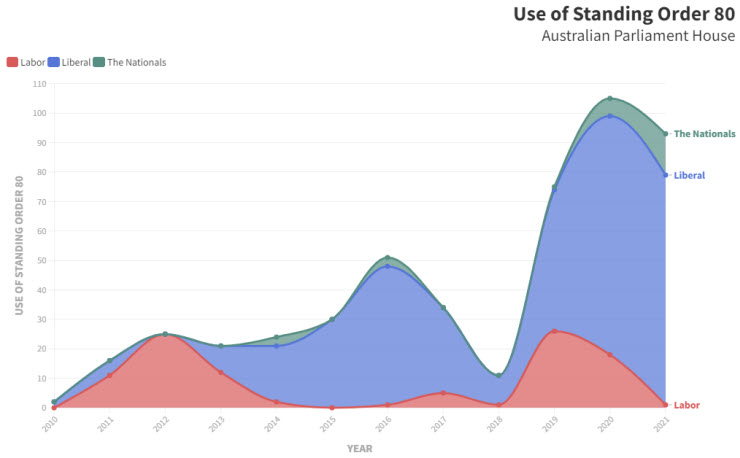
What does Scott Morrison do when he doesn’t want to let a debate in the House of Representatives get too close for comfort? He shuts it down.
Last year the Morrison government cut off 48 debates on the floor of the House of Reps, many of which were members’ motions on subjects ranging from sexual misconduct in Parliament House to action on climate.
What allows the Coalition to do this is a power called “closure of debate”. It’s referred to as the “gag motion”, and allows an MP to call a vote on whether another member may address the floor. If the vote is successful, the speaking member must take his or her seat.

Use of the gag motion has reached a decade-high under Morrison.
It has been used 232 times by the Coalition since Morrison assumed office in 2018, a 134% increase on Morrison’s predecessor, Malcom Turnbull. Last year it used it 92 times, often twice to shut down one topic.

Here are some other examples from 2021:
- February: Labor MP Pat Conroy is gagged after accusing the Home Affairs Minister of arbitrarily rejecting recommendations for the Safer Communities Fund grants. Last month an auditor-general’s report found 54% of funding decisions made during five rounds of the program were made without clear rationale
- June: Labor MP Amanda Rishworth is gagged two sentences into her speech after calling the government a “shemozzle” and critiquing Nationals’ management of the Murray Darling Basin
- October: Labor Leader Anthony Albanese is gagged for saying the Electoral Legislation Amendment (Party Registration Integrity) Bill is akin to introducing “politics and tactics of Trump’s America into Australian democracy”. The bill introducing voter ID at the polling booth was withdrawn by the Coalition in December.
The motion is a relic of Australian politics introduced in 1905 to help combat a lack of official time limits on parliamentary speeches. On adopting it, then prime minister Alfred Deakin said: “The … new standing order need rarely, if ever, be used for party purposes, and never, I trust, will its application be dictated by partisan motives.”
But with official time limits being introduced in 1912, the motion in its original function is redundant. Former Labor minister and speaker Anna Burke says it has become a political tool to “stymie debate and shut down any debate which may cause embarrassment to the government”.
“Anyone can move that a person no longer be heard, the speaker puts the motion, and if two voices are heard in dissent of the motion a division is called,” she said. “This in effect achieves the intent of [the motion] as the debate is automatically interrupted to allow the division to occur.”
Morrison has also criticised the gag motion. In 2019 he accused Albanese of being “more interested in the drama and the carryings-on of Canberra politics than he is in the serious issues that are being raised in this place” when the Labor leader gagged a debate. Despite this, Morrison’s government has the worst record of its use than of any administration in the past 10 years.
Bill Browne from The Australia Institute says that while the gag motion can be used to moderate behaviour, its increased use suggests it is being used to curtail debate.
“Since members’ speeches are typically subject to time limits, you have to question why it would be necessary to cut them off prematurely,” he said.
Browne says there is a “worrying trend” of decreasing government transparency and accountability. He cites the rise of private consultants instead of the public service, increased delays in freedom of information requests, and the creation of a cabinet committee of which the prime minister is the only permanent member.
Burke, who has first-hand experience in facilitating closure of debate as speaker from 2012 to 2013, says increased usage of the gag motion is something all Australians should be concerned about.
“Standing order 80 is being used to gag political debate and it is not appropriate,” she said. “It is used now as a political weapon by both the opposition and government … and it does not enhance our democracy or faith in our parliamentarians.”
Should our democracy continue to be threatened by this code of silence? Let us know your thoughts by writing to letters@crikey.com.au. Please include your full name to be considered for publication. We reserve the right to edit for length and clarity.








It is time for a thorough pruning of parliamentary procedures and standing orders by a Royal Commission with teeth
Parliament is the peak legislative body of this country – its Members (no sniggering at the back there!) decides their own Rules, Procedures & Standing Orders.
Which party is going to dispense with that cozy arrangement?
Parliament is the peak legislative body of this country – its Members (no chortling at the back there!) decides their own Rules, Procedures & Standing Orders.
Which party is going to dispense with that cozy arrangement?
It’s really becoming tedious trying to find which normal word sets off the madBot – this time it took a lot longer because I was baffled.
I started breaking down each word into its component letters for the fearful combination.
Turns out that the evil, wicked letters this time were in the word used for silly skoolboys s……ing over a naughty pic. so I replaced it with ‘chortling‘.
Why doesn’t this zine spend the money saved by not having subbies or dictionaries and upgrade the wheezing thing’s algorithm?
A gag motion is what I suffer if I listen to one of Morrison’s press conferences.
What a man, and a Government behind him.
They gag debate in Parliament on things they don’t really want to talk about.
They reject more FOI requests than any previous Government.
They don’t even put Legislation to the House if there is even an inkling that it could bring on a debate they don’t want to participate in, or might lose.
Is there not yet enough empirical evidence that Morrison is a lying odious grub? Tell me one good thing Morrison has done for Australian society that is not motivated by self-interested corruption.
We’ll have to ask Jenny is she gags.